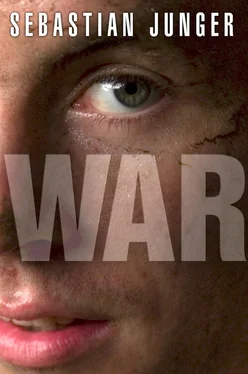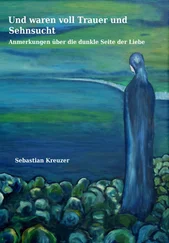The son is about ten and faces us bravely while Doc Old peels the bandage off his leg. Old has written “I’ll fuck your face” in Magic Marker on the front of his ammo rack, but whatever that means, it doesn’t seem to impede his concern for the boy. He’s been shot in the shin but the wound is months old and has turned gelatinous and brown. I can see the white of his shinbone and a small hole in front where a bullet went in. “Looks like one of ours,” Old says, meaning the hole is so small it’s probably from an American M4. AK rounds are a lot bigger and do considerably more damage. The father claims the boy got his wound by falling down, but that’s clearly absurd and the boy looks like he’d rather lose his leg than stand here any longer with these soldiers gathered around him. Doc Old kneels in front of him to put on a new bandage and when he’s done he looks up and says he should get it checked out at the KOP. To me it looks like he’s going to lose his leg at the knee. The old man glances around apologetically and shakes his head.
“All we’re going to do is help his son,” Gillespie tells the translator. “He needs to tell me a good reason why he shouldn’t go back to the KOP.”
The translator asks the man a long question and gets a long answer back. “He is tired right now and this is the praying time.”
“How long does it take to pray?” Gillespie says. “Because if he needs to pray he can pray right now. It’s just the right thing for us to do. I mean just ’cause you’re tired… it’s your son .”
In retrospect the old man’s reluctance made perfect sense — he knew what was going to happen and didn’t want to be around us when it did — but eventually Gillespie convinces him to come with us. The old man ducks into his house and comes out with a blanket and knots it over his shoulders and puts his son inside it. He falls in line and we leave the village like we came in, fast and single file, and the first burst of AK comes before the men have even gotten to the road. I’m walking behind Gillespie in the gray-dark and I hear him say, “Fuck,” and we flatten ourselves against a stone wall. There are three or four detonations and I can feel the bottom drop out of my stomach, this is my first contact since getting blown up and somehow all the fight’s gone out of me, I have no interest in any of this. I crouch against the wall and watch the men I’m with try to figure out what to do.
“Anyone got contact with Two-One, over?” Gillespie says into his radio. “Two-One” means First Squad — Sergeant Mac’s men. They’re at the top of the village covering our movement.
“Two-One, Two-One, just call,” someone repeats.
“Fuck,” Gillespie says for the second time and starts moving toward the top of the town. Stichter starts calling mortars down on Kilo Echo 2205, one of the preset targets on a ridgeline to our south, and we churn through town at a dead run, the SAW gunners gasping under their loads. Halfway up the hill Pemble reports he’s established communication with Two-One and that the detonations were outgoing 203 rounds: everything’s fine. Later we find out that a bullet splintered some wood just above O’Byrne’s head, but that’s nothing new, and we form up outside the village and move out along the road we came in on.
The old man walks bent forward with his arms clasped behind his back to support the injured boy and I have the impression he could outwalk all of us straight up a mountain if he had to. The plan is to move back to Loy Kalay along the road and deliver the old man and the boy to a Destined Company patrol that has rolled down there in Humvees. It takes the gun team a while to climb down to the road, though, so by the time we start north it’s been a good hour since the shooting. First Platoon walked straight into a night ambush on Rock Avalanche, and it seems like it would be an incredibly easy thing to do to us as well — just get a little bit ahead on the road and take out the whole lead squad with machine guns and RPGs.
While we’re waiting for the gun team to join us I have time to decide where I want to be in the line. O’Byrne is up front with the rest of his fire team — Money and Steiner and Vaughn. If we walk into an ambush they’re going to take the brunt of it, but they’re the guys I’ve been bunking with and know best. When you’re entirely dependent on other men for your safety you find yourself making strange unconscious choices about otherwise very mundane things: where to walk, where to sit, who to talk to. You don’t want to be anywhere near the ANA on patrol because they’re almost as likely to kill you by accident as they are to kill the enemy on purpose. You don’t want to be near the new guys in case they freeze or shoot so much they draw fire or jam their guns. You don’t want to be near the cowboys, either, or the guys who have to glance over at their team leader before they dare do anything. It’s subtle, what you want — I’m not sure there are even words for it — but at night on a frozen road outside an enemy village the choices you make reflect something real. I pick up my pack and move forward.
Thirty feet between Steiner and me, thirty feet between me and Vaughn. O’Byrne walking point, as usual. No sound but the scrape of boots on frozen dirt and occasionally a dog barking in the villages below. God knows how, but they sense strange men are moving through their valley and they don’t like it. There’s no moon but the stars are fierce and leak just enough light to see a bit of the road and the shapes of the men ahead. I try to avoid walking through puddles because the skim ice shatters with a disastrous clarity in the frozen air. The wind shifts heavily through the holly trees around us. I run scenarios in my mind about where I’ll go if we suddenly get lit up, but most stretches of road have no cover so my best option is to just lie down so I don’t get hit by gunfire from the men behind me.
We pass quietly below the dark masses of the mountains and occasionally we see a porch light burning down in the valley like a lone planet in an inverted sky. A long time later we’re still on the road when a sick, hollow little whistle passes overhead. A few minutes later it happens again. No one knows what it is but later I find out they were sniper rounds fired from way down-valley — off-target but still boring fiercely through the darkness bearing their tiny loads of death.
• • •
"Those rounds hit pretty close to you in Karingal?” I overhear someone ask O’Byrne after the patrol.
“Yeah, they were pretty fucking close.”
“When you didn’t radio back we thought you might have been hit. But we didn’t hear any screaming, so we figured you were okay.”
“Yeah—”
“—or he was hit in the mouth,” someone else offers.
Even O’Byrne has to laugh.
The coward’s fear of death stems in large part from his incapacity to love anything but his own body. The inability to participate in others’ lives stands in the way of his developing any inner resources sufficient to overcome the terror of death.
— J. Glenn Gary,
The Warriors
THAT SPRING STEINER GOT SHOT IN THE HEAD WHILE pinned down at the Aliabad cemetery. Third Platoon was putting in a new outpost on the spot where Murphree lost his legs and Second Platoon’s job was to set up on the crest of Hill 1705 and overwatch them while they worked. They were going to go in at dusk and work all night and hope to be done by dawn. Since the site was accessible by road they used prepoured concrete barriers trucked down on flatbeds and unloaded by bulldozer, and the next morning Gillespie decided to move his men off the mountain because the job was done. There was airpower in the next valley over and it was as good a time as any, but some of the team leaders wanted to wait until dark. “That’s why we have night vision gear,” O’Byrne said, “so that we can walk at night when the enemy can’t see us.”
Читать дальше
Конец ознакомительного отрывка
Купить книгу












